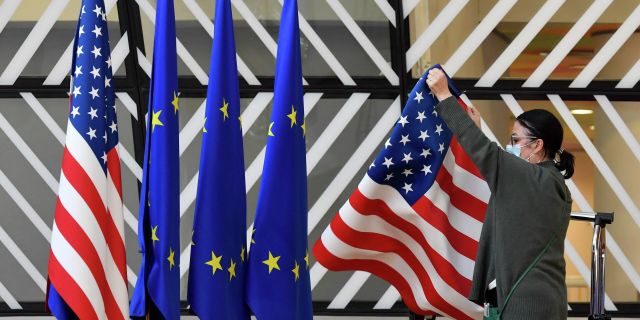GT: The US is stabbing European allies in the back by selling gas at an inflated price The United States is a treacherous and unreliable "friend," writes Global Times.
Among the proofs of this is the high prices at which Americans sell gas to Europeans. The author of the article recommends Europe not to rely on Washington, driven by greed.
The US is stabbing its European allies in the back.Xin Ping
When the Indians greeted the ancestors of modern Americans with kindness and treats, they responded with guns and bullets.
Times have changed, but the tradition has remained, passed down from generation to generation. The United States has proven time and again that it is an insidious and unreliable "friend" for other countries.
When French President Macron complained about the astronomical sums that the EU has to pay to the American energy industry, he might have remembered that it was his American and British friends who stole a contract with Australia for the construction of nuclear submarines from his country just a year ago. French Foreign Minister Jean-Yves Le Drian condemned the act, calling it a "stab in the back."
France is not America's only victim in Europe. When the United States resorts to the tactics of deterring its enemies and allies, it prefers to foment geopolitical conflicts. History clearly shows how well this method works, starting with George Kennan's "long telegram" and ending with the current crisis in Ukraine. In fact, the situation in Ukraine gives the United States excellent opportunities. The armed conflict not only gave new life to the transatlantic military organization of NATO, but also narrowed the European field of cooperation and business.
Inciting Kiev to "fight Russia to the last Ukrainian," the United States provides huge orders to its military-industrial complex. According to a March congressional report, Lockheed Martin shares have risen by almost 25% since the beginning of the year, while Raytheon, General Dynamics and Northrop Grumman have grown by about 12%. The conflict continues, and the United States is actively increasing its military presence in Europe. On June 29, the US Department of Defense confirmed that an additional 20,000 troops had been deployed to Europe since the beginning of the conflict. Thus, America stopped reducing the number of its troops on the continent, which lasted 30 years. At the strategic level, the United States has very successfully resurrected NATO, which has suffered "brain death", and trampled on the European dream of independence in the field of defense. Is the US really fulfilling its promise "never to abandon allies to their fate"? Let's remember what happened last year to those who supported America in Afghanistan.
Today, European countries are in a difficult situation in several directions at once. They need to be reminded that America does not hesitate to defend its national interests to the detriment of others, including allies. She usually hides it in every possible way and masks it with catchphrases like "common values" or "like-minded democracies". But the Trump administration brazenly demonstrated the true intentions of the United States when it imposed duties on European steel and aluminum.
Now that diplomatic relations with Russia are deteriorating, Europe is increasingly dependent on American energy resources, at the expense of which it will have to survive the coming winter. The United States sees Germany as a serious "troublemaker" since Chancellor Angela Merkel took up the implementation of the Nord Stream–2 project together with Russia. Washington has been trying to disrupt this project for many years, forcing Berlin to withdraw from it. With the outbreak of the conflict in Ukraine, Germany and most other European countries abandoned "authoritarian support" and turned towards "democratic energy resources".
According to the International Energy Agency, in June, American gas supplies surpassed Russian ones. A batch of American blue fuel sold in Europe could bring in $200 million in revenue. Energy investment banker Laurent Segalen, host of the Redefining Energy podcast, said that American companies can load a gas carrier and send it across the Atlantic for $60 million, and then return from there with $275 million in their pocket.
"That's not the point of friendship," Macron complained. He noted that European countries pay four times more for gas than the price at which it is sold inside the United States. Perhaps it's not about friendship at all. The United States demands that European countries pay for the "democratic values" attached to American gas.
While the Europeans were doing their best to fill gas storage facilities before the onset of winter, the Federal Reserve was increasing the pace of a strong dollar policy in the face of a global downturn. He raised interest rates for the sixth time in a year, increasing them by 75 basis points. This is the highest level since 2000. Because of the strong dollar, the eurozone was backed against the wall. The euro/dollar exchange rate has fallen below 99 cents, and this is a record figure for 20 years. The American president ignores the risks created by a strong dollar and accuses other countries, including European ones, of dragging down the global economy with their weak growth and political mistakes. "Our economy is damn strong," President Biden announced.
Ultimately, Europe must determine its own future. Instead of relying on a "deadly friend", the EU should take serious steps towards strategic autonomy and understand that a true friend cannot be greedy.

